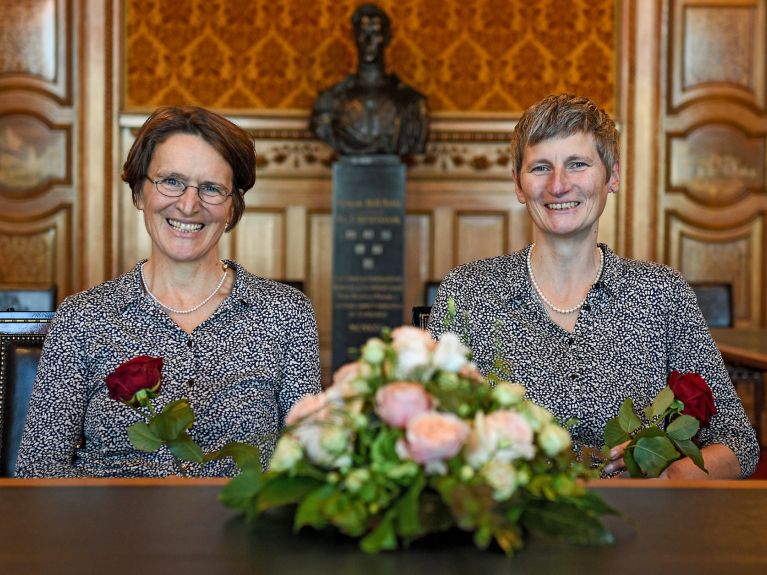A moving moment
It’s been a long journey to marriage for all: two women say what it means to them to have the full rights of a married couple, at long last.

Germany. The first kiss as a freshly married couple in the splendid council chamber of Hamburg’s Town Hall was a moving moment for Marion Eggers and her wife Maria Undine. It was the third time they had said: “I do”. “Getting married three times, three times to the same woman, and every time it feels different,” says 57-year-old yoga teacher Marion. Every “I do” was a milestone along the extremely long path to legislative equality between same-sex couples in Germany.
Three stages to marriage for all
The two women went through stage one in the year 2000. At the time they used the new possibility of the “Hamburg marriage”: same-sex couples were able to enter their names in a partnership book at the registry office. Although this had no legal consequences, it did have important emotional and symbolic meaning. This was followed by the “registered civil partnership” in 2001 which brought many duties with it, but few rights. This special arrangement was dubbed “homo marriage”. So this third “I do” is understandably a huge source of triumph and happiness for Marion and Undine Maria Eggers, because since the law came into effect on 1 October 2017 all marriages are equal: Ehe ist gleich Ehe.
The right to mainstream equality
On 30 June the majority of the members of the Bundestag voted to finally do away with any exceptions from the legal right to marry. Now, Paragraph 1353 of the German Civil Code states: “Marriage is a life-partnership entered into by two people of different sexes or the same sex.”
Not only traditionalists are having difficulty with the decision. For instance, Silke Burmester wrote in the newspaper Süddeutschen Zeitung that it was precisely the supposedly anti-bourgeois group that was now cheering about free access to the institution of marriage. But, the columnist asks: “Why should homosexuals be less conformist than heterosexuals?” Especially since there has to be a legal right to marriage before people can reject it as being petty-bourgeois, or, before they can grasp it as an opportunity to be a legally united couple in the eyes of the state. And this goes hand-in-hand with all of the duties and rights – including the right to adopt children.
Partner look at the wedding
That was one of the reasons why Marion and Undine Maria Eggers wore the same outfits for their wedding. “We wanted it to be different from the first time when we wore opposite colour schemes: one of us had dark trousers and a white blouse, and the other had white trousers and dark blouse. This time we wanted to send out a signal.” The signal that only love counts, the wish to grow old together and to assume responsibility for each other. This time, with the state’s blessing.

